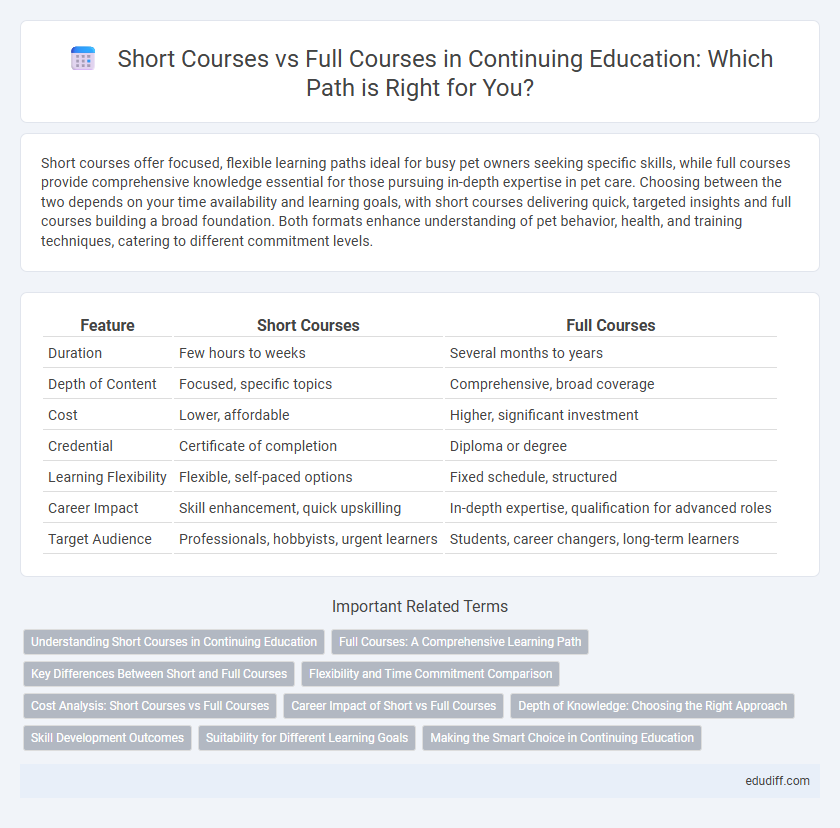Short courses offer focused, flexible learning paths ideal for busy pet owners seeking specific skills, while full courses provide comprehensive knowledge essential for those pursuing in-depth expertise in pet care. Choosing between the two depends on your time availability and learning goals, with short courses delivering quick, targeted insights and full courses building a broad foundation. Both formats enhance understanding of pet behavior, health, and training techniques, catering to different commitment levels.
Table of Comparison
| Feature | Short Courses | Full Courses |
|---|---|---|
| Duration | Few hours to weeks | Several months to years |
| Depth of Content | Focused, specific topics | Comprehensive, broad coverage |
| Cost | Lower, affordable | Higher, significant investment |
| Credential | Certificate of completion | Diploma or degree |
| Learning Flexibility | Flexible, self-paced options | Fixed schedule, structured |
| Career Impact | Skill enhancement, quick upskilling | In-depth expertise, qualification for advanced roles |
| Target Audience | Professionals, hobbyists, urgent learners | Students, career changers, long-term learners |
Understanding Short Courses in Continuing Education
Short courses in continuing education provide targeted learning experiences designed to develop specific skills or knowledge within a limited timeframe, typically ranging from a few days to several weeks. These courses often emphasize practical applications and flexible scheduling, making them ideal for professionals seeking rapid upskilling or industry-relevant updates without committing to the extensive curriculum of full courses. Their focused content and concise format enable learners to efficiently enhance expertise in areas such as digital marketing, project management, or language proficiency.
Full Courses: A Comprehensive Learning Path
Full courses provide an in-depth and structured learning experience, covering foundational concepts and advanced topics within a subject. They offer extensive resources, including lectures, assignments, quizzes, and projects, enabling learners to develop a thorough understanding and practical skills. This comprehensive approach ensures mastery and better preparation for professional applications or further academic pursuits.
Key Differences Between Short and Full Courses
Short courses offer condensed learning experiences focused on specific skills or topics, typically lasting from a few hours to several weeks, enabling quick knowledge acquisition and flexible scheduling. Full courses provide comprehensive education covering broader subjects in-depth over several months or an academic term, often culminating in a formal qualification or credit. The key differences lie in duration, depth of content, certification value, and target audience, with short courses appealing to professionals seeking skill enhancement and full courses suited for foundational or extensive academic development.
Flexibility and Time Commitment Comparison
Short courses offer greater flexibility, allowing learners to tailor study schedules around work or personal commitments, making them ideal for busy professionals. Full courses require a more substantial time commitment, often spanning several months or semesters, which benefits those seeking comprehensive knowledge and structured learning environments. The difference in time investment directly impacts the ability to balance education with other responsibilities, with short courses providing a more adaptable approach to skill development.
Cost Analysis: Short Courses vs Full Courses
Short courses typically have a lower upfront cost compared to full courses, making them more accessible for individuals seeking specific skills without a large financial commitment. Full courses often require higher tuition fees but provide comprehensive content and certifications that may justify the investment for long-term career advancement. Evaluating the cost-benefit ratio involves considering the desired learning outcomes, duration, and potential return on investment for each course type.
Career Impact of Short vs Full Courses
Short courses offer targeted skill development that can quickly enhance employability and adapt to industry demands, providing a faster route to career advancement. Full courses deliver comprehensive knowledge and deeper expertise, essential for long-term career growth and specialized professions. Employers often value the practical skills gained from short courses but rely on full courses for roles requiring extensive theoretical background and credentials.
Depth of Knowledge: Choosing the Right Approach
Short courses offer targeted learning on specific skills, providing essential knowledge quickly but with limited depth. Full courses deliver comprehensive content, fostering a deeper understanding through extended study and practical application. Selecting between the two depends on whether immediate skill acquisition or thorough mastery is the primary goal.
Skill Development Outcomes
Short courses rapidly enhance specific skills by targeting key competencies through focused, practical training, making them ideal for skill development in evolving industries. Full courses deliver comprehensive knowledge and foundational understanding, fostering long-term expertise and critical thinking abilities essential for advanced professional roles. Choosing between short and full courses depends on career goals, desired depth of knowledge, and time availability for skill acquisition.
Suitability for Different Learning Goals
Short courses are ideal for learners seeking targeted skill development or rapid knowledge acquisition in specific areas, providing flexibility and concise content. Full courses suit those aiming for comprehensive understanding and in-depth expertise, often required for professional qualifications or academic advancement. The choice depends on individual goals, time availability, and the desired depth of mastery in the subject matter.
Making the Smart Choice in Continuing Education
Choosing between short courses and full courses depends on your career goals, time availability, and budget constraints. Short courses offer focused, skill-specific training ideal for immediate application and quick upskilling, while full courses provide comprehensive knowledge and credentials that support long-term career advancement. Evaluating industry demands and personal learning preferences helps ensure the most strategic investment in continuing education.
Short Courses vs Full Courses Infographic

 edudiff.com
edudiff.com